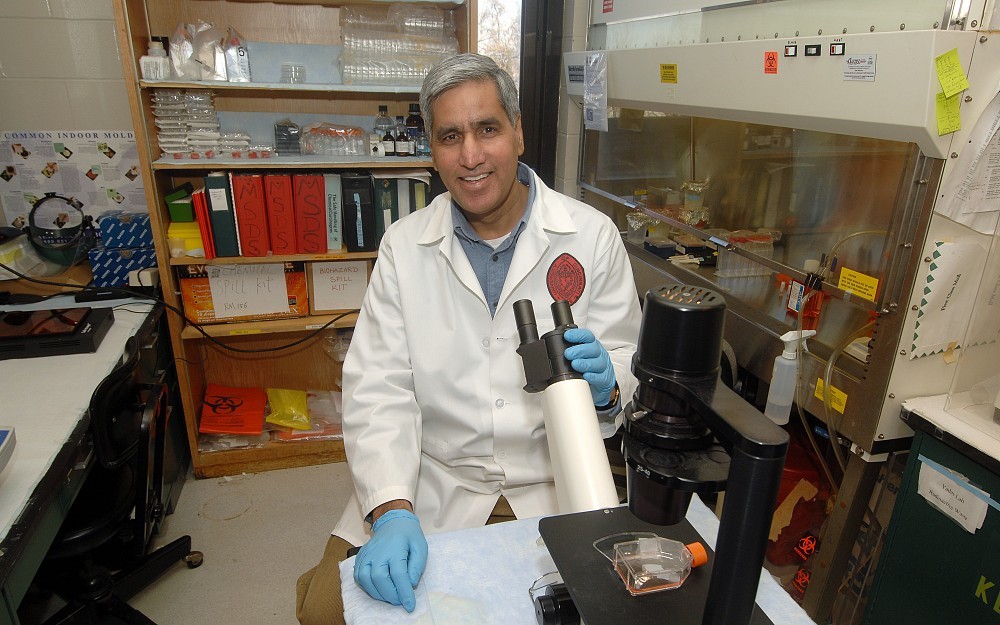
$2 Million Grant Targets Environmental Pathogens Linked to Chronic Lung Disease
CincinnatiA $2 million grant from the National Institute for Occupational Safety and Health will support University of Cincinnati (UC) research to determine the link between environmental pathogens and lung disease in the workplace.
Led by Jagjit Yadav, PhD, this ongoing environmental health research study seeks to determine what specific mycobacteria (microscopic pathogens) and their antigens are linked to work-induced hypersensitivity pneumonitis, a pulmonary disease that leads to chronic inflammation of the lungs.
The immune-mediated disease is caused by the inhalation of microscopic substances, which trigger the bodys immune system leading to coughing as well as shortness of breath, chills, headaches and fatigue. The specific mycobacteria antigens causing this disease, however, remain to be determined.
"One of the problems with hypersensitivity pneumonitis is that it is difficult to diagnose clinically and there are no specific lab tests to aid in diagnosis, explains Yadav, associate professor of environmental health at the UC College of Medicine. "Unless the patient is seeing a physician who is knowledgeable about occupational pulmonary medicine, hypersensitivity pneumonitis is often mistaken as asthma or bacterial pneumonia or some other lung condition. Left untreated, it can cause irreversible scarring on the lung.
Yadav estimates that more than 1 million machine workers are exposed to potentially harmful machining fluids on a regular basis in the workplace.
Fluids used in many machining operationscutting, metal grinding and coolingoften harbor harmful microorganisms, including mycobacteria. Once released into the air, these contaminants are inhaled by workers and can cause an inflammatory response in susceptible individuals.
UCs study will focus on identifying the role of unique mycobacteria strains and their antigens associated with metal working fluids used in machining industries.
In previous work funded by NIOSH, Yadav and his colleagues identified unique strains of two mycobacteria species from machining fluids associated with hypersensitivity pneumonitisM. immunogenum and M. chelonae. More research is needed, however, to identify the key antigens from these strains that lead to human disease.
"Once these critical antigens are identified, we will have potential targets for novel immunodiagnostic strategies and possibly future therapeutic or vaccine development options, explains Yadav.
Yadav and his colleagues will analyze the molecular and cellular profile of hypersensitivity pneumonitis in both experimental lab models and human patients in an effort to hone in on a biological marker that could provide important clues on how to better diagnose the disease.
Collaborators in the study include James Lockey, MD, and Paul Succop, PhD, of UC, Bill Eshenbacher, MD, of the Cincinnati Veterans Affairs Medical Center, Charles Pue, MD, of the Sleep and Breathing Research Institute in Columbus, Ohio, and Kenneth Rosenman, MD, of Michigan State University.

Jagjit Yadav, PhD performs step one of mycobacterial antigen profiling

Jagjit Yadav, PhD, and Shalini Bhatnagar perform step two of the antigen profiling by two-dimensional gel electrophoresis

Jagjit Yadav, PhD, and Shalini Bhatnagar perform step two of antigen profiling by two-dimensional gel electrophoresis

Mycobacteria strain M. immunogenum
Related Stories
Ohio could soon make breast cancer screenings more affordable
May 9, 2025
The University of Cincinnati Cancer Center's Ann Brown was featured in Local 12 and Cincinnati Enquirer reports on a bill introduced by Rep. Jean Schmidt in the Ohio legislature that seeks to eliminate out of pocket medical expenses such as copays and deductibles associated with supplemental breast cancer screenings.
Preparing students for artificial intelligence in education
May 8, 2025
Laurah Turner, PhD, associate dean for artificial intelligence and educational informatics at the University of Cincinnati's College of Medicine, recently joined the For The Love of EdTech podcast to discuss the usage of personalized learning and AI coaches to enhance educational experiences.
UC lab-on-a-chip devices take public health into home
May 8, 2025
University of Cincinnati engineers created a new device to help doctors diagnose depression and anxiety. The “lab-on-a-chip” device measures the stress hormone cortisol from a patient’s saliva. Knowing if a patient has elevated stress hormones can provide useful diagnostic information even if patients do not report feelings of anxiety, stress or depression in a standard mental health questionnaire.
